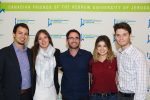Some of the attendees at the July 16 event, left to right: Daniel Wosk, Julia Goudkova, Shai Josopov, Sigal Kleynerman and Daniel Milner. (photo from CFHU Vancouver)
Israel’s best “natural resource” is its people. On July 16, at the Jewish Community Centre of Greater Vancouver, four speakers, representing diverse segments of Israeli society, gave TED Talk-style presentations before a sold-out crowd at the Jerusalem: City of Gold and Tech event. The common denominator of the speakers was their connection to Hebrew University of Jerusalem.
Presented by Canadian Friends of Hebrew University (CFHU) in conjunction with the Jerusalem Foundation and the JCCGV, the evening presented the many ways in which Israel is using its human capital to leverage its place in the world and continue to be the innovative nation for which it has become renowned.
Lior Schillat is the head of the Jerusalem Institute for Policy Research (JIPR), an organization that collects data on multiple aspects of Jerusalem. Although statistics don’t tell the whole story, the data collected by Schillat’s institute shed a great deal of light on how people in Jerusalem live, work and play. He explained that the city is constantly faced with a power struggle between three groups with very different worldviews: ultra-Orthodox Jews, Arabs and “the general public.” These groups have not only diverse needs and interests but also huge variances in almost every part of daily life. JIPR attempts to use the data they collect to influence lawmakers to try to minimize conflicts and use the city’s diversity to empower everyone, said Schillat, “instead of the zero-sum game we used to play, where we win and the others lose. We want to turn Jerusalem into a win-win for everyone.”
Schillat’s optimism was shared by the second presenter, Maya Halevy, director of the Bloomfield Museum of Science in Jerusalem. Although her goal is to promote an interest in and love of science, her ultimate objective is to ensure that Israel has a workforce equipped for the future. She explained the programs in STEM (science, technology, engineering and math) that her museum provides to all segments of Jerusalem’s population.
“We need to make connections with families and students,” she said. “Over 200,000 Arab and ultra-Orthodox visitors use our museum. We serve all communities with STEM literacy.”
Halevy said that, while it is easier to attract ultra-Orthodox families to the museum, Arab families as a whole stay away but they send their children through school programs. Her message, similar to Schillat’s, was that Israel will thrive when all segments of the population are educated and have equal chances to be successful.
Meanwhile, Yonatan Avraham is living his dream of becoming a physicist and an entrepreneur. He is an example of someone who is thriving because of the education he is receiving at Hebrew U. He is also the beneficiary of Toronto philanthropist Seymour Schulich’s scholarship program. Avraham expressed his gratitude regarding the place where he is studying.
“I am at the intersection of three unique resources that are ecosystems for innovation: the academic knowledge at Hebrew U, Jerusalem as a municipality supportive of start-up companies and a young, dynamic student atmosphere,” he said. “The combination has produced many innovators who are able to take their ideas to market and grow the Israeli economy.”
Helping smart people turn their ideas into companies that make money is how the final speaker of the night fit in. Tamir Huberman serves in several capacities at Yissum, Hebrew U’s technology transfer company. He works with researchers who are constantly asking the question, “How can I make this better?” What “this” is depends on the scientist, he said, but, with Israeli chutzpah, tachlis (getting to the point quickly), problem-solving ability and the pressure of existential threats fueling the process, Huberman explained that Israel is producing many great companies. Yissum is the exclusive owner of all intellectual property produced at Hebrew U and has created 120 spin-off companies since its creation in 1964. Profitable for the university, Yissum helps monetize the brain-power Halevy nurtures, Schillat influences and Avraham exemplifies.

